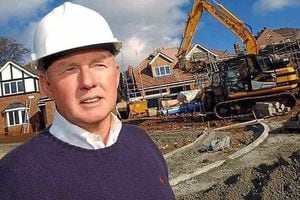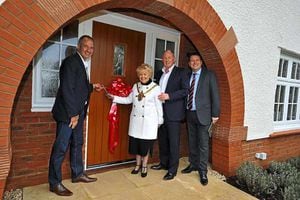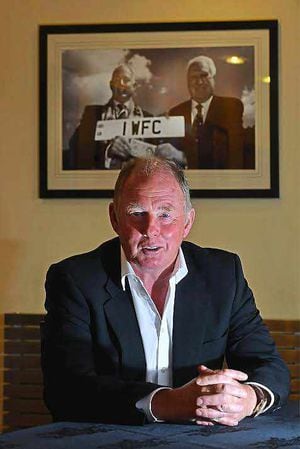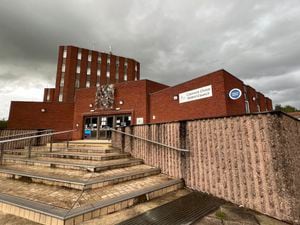Wolves for sale: Steve Morgan goes with his pride and profit
Steve Morgan is the very image of a self-made man; smart, determined and brimming with self confidence.

This determination has taken him from the tough streets of Toxteth and Garston in Liverpool to a place on the Sunday Times Rich List and an estimated worth of £740 million.
It also brought him his very own football club. Not the Liverpool he may have dreamt of as a lifelong fan, but Wolverhampton Wanderers.
Steve Morgan brought his own brand of business nous with him to Molineux, working closely with chief executive Jez Moxey to keep Wolves on a financial even keel even during the footballing collapse that sent the club plummeting down into the third tier.
Many will argue about the football and team decisions that have been made during his tenure as chairman, but it is hard to fault his handling of Wolves as a business.
He is considered one of the most astute builders and property developers in the country, particularly after the way he rebuilt Redrow, the housebuilder that he first founded as a 21-year-old, after it ran into serious trouble in the wake of the nation's devastating recession.

Steve Morgan has certainly come a long, long way since 1974, when he borrowed £5,000 from his father to to buy his then employers, Wellington Civil Engineering, which was on the verge of going out of business.
That investment by the on-site engineer was the first step in a business career which peaked in the formation of housing giant Redrow.
"All I knew for certain was that I had a passion for the construction industry, and was determined to make Redrow a success," he recalled in a company history produced for employees.
He ran it until 2000 when it was floated on the London Stock Exchange, making him even wealthier.
In the 1990s he had already started investing in hotels, eventually merging his interests into De Vere Hotel Group.

In the process he earned a Queen's honour, an OBE, in 1992 for services to the construction industry, and amassed a fortune from his business activities, mostly involving property, building to around £425 million by the time he started talking to Wolves then owner, the legendary Sir Jack Hayward.
The announcement, on May 22, 2007, that Morgan was the new man at Molineux came like a bolt from the blue.
Sir Jack famously wrote off a £70 million investment in the club to pass it over, lock, stock and barrel, to the 54-year-old Steve Morgan in return for a token £10.
In return Morgan guaranteed a £30m kitty to further develop the club, which had just missed out on the Championship play-off final.
But it was clear from the start there would be no return to the club's notorious heavy spending days of the 1990s.
The deal came three years after Morgan came close to buying his beloved Liverpool – at one stage offering a £73 million cash injection – but he switched his attention to Wolves in the wake of Sir Jack's decision to sell, announced shortly before Christmas 2006.
As well as a football fan, Steve Morgan had also exhibited a strong social conscience. He had set up the Morgan Foundation in 2000 to help the less privileged and donated £100,000 in cash prizes to his Morgan Foundation entrepreneur awards.
Most recently he has been a driving force behind The Way, Wolverhampton's city centre Youth Zone project off School Street. A state-of-the-art sport and leisure complex that will revolutionise facilities for the city's young people when it opens in January.
His first few years with Wolves seemed touched by magic. In May 2009 Wolves were promoted as champions from the Championship to the Premier League.
In the same year Steve Morgan launched his bid to take back control of Redrow.
The company had just announced a £46.2 million loss.
He still owned a substantial stake in the business, so improving its performance made financial sense, but there will have been an element of personal pride, to reclaim the business he had first built up and return it to profitability.
In a boardroom coup he took over as executive chairman and starting clearing its £269 million debt mountain. He shifted its focus away from apartments and social housing towards high quality family homes, particularly in the wealthy South.
A stagnant housing market, almost frozen in the fallout from the recession, was littered with schemes put on ice but under Morgan, Redrow restarted work on mothballed housing sites.
He started cutting losses, bought a bigger share of the business and finally got Redrow back into the black.
This year he was able to announced a record year for Redrow, smashing the £1 billion sales barrier and returning pre-tax profits of £204 million.
As part of a doubled dividend payout to shareholders he also paid himself £6 million, but there are few Redrow investors who would begrudge him that.
Sadly, success in business has not been matched to the same extent by success on the football pitch.
In May 2012 Wolves were relegated back to the Championship after three tough seasons in the Premier League.
And things went from bad to worse.
Manager Mick McCarthy was sacked and followed by an embarrassing string of unsuccessful appointments as the club plummeted through the division to be relegated at the end of the season, down to League One.
By this time many fans had fallen out of love with the new owner, and there were frequent cries of "Moxey, Morgan out!" online and on the terraces.
Many fans believed he hadn't spent enough money on players. It certainly seemed as if the business brain behind the turnaround of Redrow was unable to serve him as well at Wolves.
The appointment of Kenny Jackett initially received a mixed reception from Wolves fans, but many were won over by the way he led the team back into the Championship and its success in his first season.

Mr Morgan has invested heavily in improving the stands at Molineux, but a perceived a lack of spending on new players over his tenure – and particularly this summer when star player Bakary Sako was not replaced – has not gone down well and there are now fears that prudent financial management is undermining ambition at the club.
Certainly, after eight years of putting his heart and soul in Wolves, Mr Morgan must be stung by the continual criticism from elements on the terraces.
He is a proud and successful man, and he clearly feels enough is enough.
This is a man who always said that if the fans did not want him, he would go.
Rumours about a stand-up row with fans after Wolves' poor performance at the weekend – a 1-1 draw against nine-man Preston North End – may well have been the straw that broke the camel's back.
One thing is for sure; Wolves is today worth considerably more than when Mr Morgan bought it – not least in terms of the property portfolio he has built up around Molineux as well as its expanded training ground at Compton Park.
As a hard-headed businessman it is hard to see Mr Morgan not making a significant profit on his initial £30 million investment.





